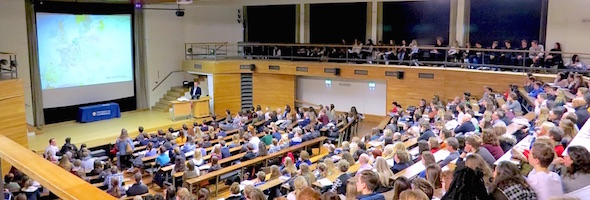
Cambridge is a unique and historic university with an international reputation for teaching and research. Whilst some find this enticing, others may not be sure if Cambridge is the type of place for them. Yet, every year, thousands of students, from all walks of life, apply to study at Cambridge, and go on to have lasting and life-changing experiences which benefit their personal lives and careers.
Why study languages at Cambridge?
As an MMLL student, you will have more contact hours than some of your friends taking other humanities subjects, but you will also spend lots of your time reading and working independently. There are lots of resources to help you and comfortable spaces to work in. You will soon find your favourites, whether it’s your College Library, the MMLL Faculty Library, one of the University Library’s big reading rooms, the Language Centre or a quick hour between lectures at a café near the Faculty.
What's it like at Cambridge?
MMLL Faculty Library
The Modern and Medieval Languages and Linguistics Library supports teaching and learning in European languages, literatures and cultures and in linguistics. The Library holds over 115,000 books and 3,500 films as well as European magazines and newspapers, e-books, e-journals and a small selection of scholarly print journals. MMLL undergraduates should find all the material they need for their studies in these collections. As well as offering a quiet location for independent study, it organises tea breaks, and offers help with bibliographies and study skills.
Cambridge University Library
From as early as the middle of the fourteenth century, the University of Cambridge owned and kept in its treasury a collection of books. Since 1710, the Cambridge University Library has been among the nine privileged libraries of copyright in the UK: it is legally entitled to a copy of every book published in this country. It is now home to over 8 million books, journals and other items, and has one of the largest collections on open shelves in Europe.
With over two million volumes housed on open shelves, you can benefit from immediate access and unparalleled opportunities for browsing. Uniquely for a legal deposit library, much of its collection may be borrowed by students. The Library is ideal for in-depth research, and there are seven large reading rooms perfect for private study. Many of its collections can also be accessed online, so that you can use the UL wherever you are. It runs tours and exhibitions throughout the year and subject specific research skills classes to help you navigate the collections.

Online resources
All your courses make resources and materials available on Moodle, the Virtual Learning Environment. Online resources (often custom developed by members of the Faculty) provide essential support to language courses and opportunities for independent study.
The Language Centre
Independent from the Faculty and open to all members of the University, the Language Centre supports the teaching and learning of languages throughout the University. If you want to learn another language, there is the option of taking a course at the Language Centre to obtain a further qualification. Courses are available in basic and intermediate Arabic, Mandarin, Japanese, Persian, Swahili and Urdu; and in basic, intermediate and advanced French, German, Italian, Modern Greek, Portuguese Russian and Spanish. In addition, the Language Centre can help you find a conversation partner, and has extensive resources for the independent study of pretty much any world language.
The Cambridge system is unique, and we teach in many ways, so you benefit from a rich combination of methods: from the intimacy of small group 'supervisions', to medium-sized seminar discussions, language classes, and larger lectures. We are proud of our commitment to teaching, and love working with our students as they develop their ideas.
Language classes
Most of our language classes are taught by native speakers. The Faculty arranges language classes, typically with 10-18 students, that develop your confidence to use the language, both in writing and speaking. We will look at grammar, syntax, idiomatic expression and your skills in translation, both to and from the language. In addition, you will have regular oral practice in smaller groups, typically in pairs. In your second year, you may well take an ‘audio-visual’ class in your post-A Level language, which will develop your comprehension skills in advance of the Year Abroad and provide an opportunity to engage with contemporary cultural issues. In your final year you will have classes in translation and a course on cultural issues focusing on identity.

Supervisions
For each of the courses you follow in literature, culture, history, and linguistics and for many language classes you will have regular (usually fortnightly) ‘supervisions’ in small groups, typically in pairs. Supervisions are the unique hallmark of the Cambridge education. The supervisions are led by lecturers, professors, and advanced PhD students who specialise in the area that you are studying – so you could find yourself discussing Baudelaire’s poetry or Nietzsche’s philosophy one-to-one with somebody who has just published a book on it. You will typically write a short essay for each supervision, which you will discuss, as well as considering the topic in general. For language supervisions you will be able to explore points of grammar, translation issues and idiomatic expressions in more detail. This is an exciting form of teaching: intensive, exploratory and led by you. It offers potentially the most stimulating kind of education there is.
Lectures and Seminars
The Faculty runs lectures which support your studies. Typically, there is a sequence of lectures (1-2 per week) for each course you follow. Some courses might use a mixture of lectures and seminars. Lectures provide background, signposts, models of critical approaches, and introduce you to new concepts and ideas.


